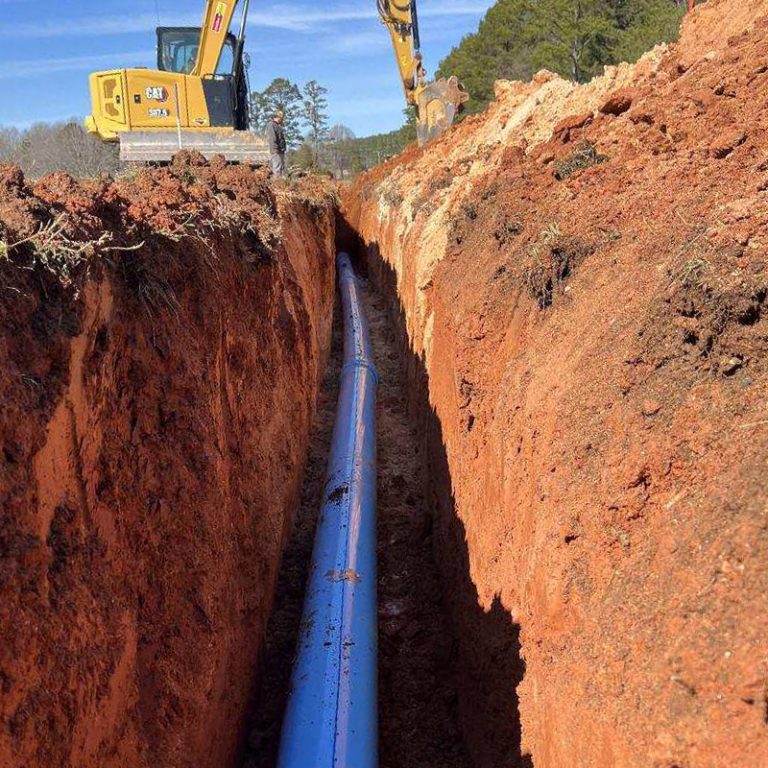
Building Resilience Through Interconnection
Cleveland County Water – Cherryville Water Interconnection
When Every Drop Counts, Connection Matters
McGill recently partnered with Cleveland County Water (CCW) to design and deliver a critical interconnection with the City of Cherryville. This 12,000-linear-foot (LF) water line creates a looped feed within the Waco pressure zone in the eastern portion of Cleveland County. This project is not just about pipes and valves; it is about creating a safety net for two communities by ensuring reliable water supply and emergency preparedness for years to come.
Water systems are the backbone of thriving communities, but they are also vulnerable. A single point of failure — whether from drought, equipment breakdown, or unexpected demand — can disrupt service and put public health at risk. The Cherryville Interconnection project addresses that challenge with the addition of this link.
Project Components
 McGill’s team provided surveying, modeling, design, bidding, and construction administration for this ambitious project. Key components included:
McGill’s team provided surveying, modeling, design, bidding, and construction administration for this ambitious project. Key components included:
- 12,000 LF of new 4-inch, 6-inch, and 8-inch water line starting at Tobe Bridge Road before extending along Old Post Road to Paul Beam Road; then it goes along Paul Beam Road to cross the CSX railroad and connect to the existing CCW water system
- A new 8-inch water line on Paul Beam Road and West Academy Street that ends with a dual master meter for accurate flow monitoring
- 13 fire hydrants, valves, and related appurtenances
- Integration with the new Waco Pump Station (also designed by McGill)
This interconnection includes supervisor control and data acquisition (SCADA) components that allow CCW to provide water to Cherryville and, if needed, allow CCW to purchase water from Cherryville.
Project Impact
The result? A looped feed within the Waco pressure zone that can deliver 700 gallons per minute and fill Cherryville’s elevated tank on West Academy Street. Looped water lines reduce how often communities must flush the lines to remove water that has become stagnant, discolored, or accumulated sediment. Looping ensures adequate levels of disinfectants and reduces water loss, which decreases costs.
This $1.94 million project was made possible through a special earmark from the North Carolina General Assembly. It is a prime example of how strategic funding and engineering expertise can work together to deliver long-term value for communities. This connection means water can flow both ways, providing flexibility during emergencies and peak usage. It is a proactive solution that improves resilience, supports growth, and safeguards essential services.
Beyond the numbers, the real impact is peace of mind. Residents and businesses in both Cleveland County and Cherryville now have a stronger, more reliable water system. This is in the best interest of the State of North Carolina because communities with resilient water systems are more likely to attract business investment.
Infrastructure projects like this prepare us for tomorrow’s challenges. By investing in interconnections and system redundancy, communities can reduce risk, improve service reliability, and support sustainable growth. At McGill, we are proud to play a role in building that future —one connection at a time.
Interested in learning more about McGill’s water and wastewater solutions?
Our water engineering team and financial planning consultants can help you identify opportunities to improve the resiliency of your water system. We can help with intermunicipal agreements, mergers and regionalization studies, and interconnection feasibility studies. When you are ready to complete a waterline interconnection project, we can help with the funding, design, bidding, and construction phases.
Learn more about our water and wastewater engineering services, and reach out to Mike Dowd, PE, to start a conversation about how an interconnection project could build resilience in your community.


